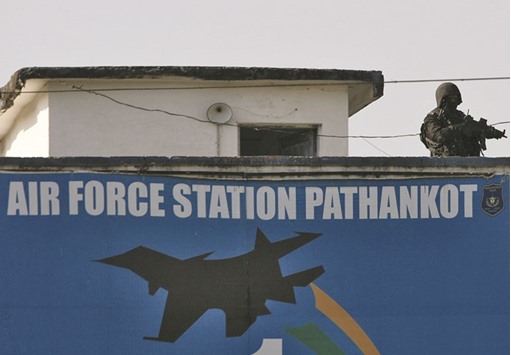Prime Minister Narendra Modi yesterday urged his Pakistani counterpart to take “firm and immediate action” against those behind an attack on an Indian Air Force base that left seven soldiers dead.
The Prime Minister’s Office (PMO) said New Delhi had given Islamabad “specific and actionable information” on the audacious attack, which came just days after a landmark visit to Pakistan by Modi raised hopes of improved relations.
In a statement, the PMO said Pakistan’s Prime Minister Nawaz Sharif had telephoned him to discuss the attack on the Pathankot base in the northern state of Punjab near the border with Pakistan.
Modi “strongly emphasised the need for Pakistan to take firm and immediate action against the organisations and individuals responsible for and linked to the Pathankot terrorist attack,” said the statement.
“Specific and actionable information in this regard has been provided to Pakistan.”
It said Sharif had given assurances that his government would take “prompt and decisive action”.
Pakistan had already condemned the attack, which began on Saturday with a dawn raid on the vast air base that triggered a 14-hour gunbattle.
In a statement the Pakistan government said it was working on “leads” provided by India and called for both sides to remain committed to dialogue.
“The challenge of terrorism calls for strengthening our resolve to a co-operative approach,” it said.
Some analysts have suggested the rare targeting of an Indian military installation outside Jammu and Kashmir may have been aimed at derailing talks between the neighbours.
It coincided with a 25-hour siege near an Indian consulate in Afghanistan that left at least one policeman dead and 11 others wounded.
Modi’s comments came as Defence Minister Manohar Parrikar said the Pathankot attack had exposed “some gaps” in security following media criticism of how the incident was handled.
Gunshots could still be heard from the base yesterday - more than 48 hours after the raid - leading some to question why it took so long to neutralise the six assailants, all of whom were finally killed.
“I do see some gaps (in security), which will be clear after investigations,” Parrikar told journalists.
He stressed that the base was a “complicated area” spread over nearly 5,000 acres and housing 3,000 families.
It has emerged that the militants hijacked a police officer’s car but that his call to a colleague, after he was dumped by the roadside, was not taken seriously. The National Investigation Agency, a central body set up to probe such cross-border attacks, is investigating.
The United Jihad Council (UJC), an alliance of pro-Pakistan militant groups based in the Pakistani-administered Kashmir region, has claimed responsibility for the assault.
The group’s leader warned that their attacks “can engulf all of India” if the issue of Kashmir’s divided rule is not resolved.
“Whenever they want, wherever they want, they can target the enemy,” UJC leader Syed Salahuddin said in a voice recording released by a group spokesman yesterday.
The claim of responsibility has, however, met a sceptical response among India’s security establishment, which blames another group called Jaish-e-Mohamed.
That group was founded by Masood Azhar after he was released by India in 1999 in exchange for passengers on an Indian Airlines plane that was hijacked.

A soldier stands guard on a building at the Indian Air Force (IAF) base at Pathankot yesterday.
